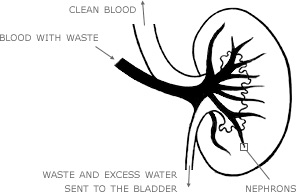Late effects: Kidney health
The kidneys are vital organs responsible for filtering out waste products from the blood, controlling blood pressure, and stimulating red blood cell production. Treatment for blood disorders can sometimes damage the kidneys. It is important to understand how the kidneys function so that you can keep your kidneys as healthy as possible.

How do the kidneys work?
The kidneys are two bean-shaped organs, each approximately the size of an adult fist, located below the ribcage near the middle of the back.
The kidneys filter more than 180 litres of blood each day, removing harmful waste products and excess water, and returning important elements (such as calcium, sodium and potassium) to the blood.
After the blood is filtered by the kidneys, the excess water and waste products become urine. The urine flows from the kidneys to the bladder through tubes called ureters. The bladder then stores the urine until it is full, at which time the waste is emptied from the body through the urethra.
How is kidney function measured?
Kidney function is measured in percentages. Two normal kidneys account for 100% of kidney function. A single kidney provides about 50% of kidney function.
People can lead a normal life with one kidney as long as the single kidney remains healthy.
When kidney function drops to less than 50% of normal, the risk of health problems increases. Serious health problems and symptoms are more frequent when kidney function drops to below 20%. Dialysis or transplant is necessary if kidney function falls to 15% or below.
What previous treatments can cause kidney problems?
Radiation involving the kidneys can cause problems, including:
- Kidney (renal or flank) radiation
- Abdominal radiation
- Total body irradiation (TBI)
Certain medications that can cause kidney damage include:
- Cisplatin and Carboplatin
- Methotrexate
- Ifosfamide
- Certain antibiotics used to treat bacterial and fungal infections, such as tobramycin, gentamicin, and amphotericin
- Certain medications used to treat graft-versus-host disease, such as cyclosporine and tacrolimus
Other risk factors that may increase the chance of kidney problems include:
- Nephrectomy (surgical removal of a kidney)
- Medical conditions that may affect the kidney, such as high blood pressure or diabetes
- History of urinary tract problems, such as frequent urinary tract infections, back-flow of urine into the kidney (reflux), or other urinary tract abnormalities
- Family history of kidney disease
- Cystectomy (removal of the bladder) – this increases the risk of chronic urinary tract infections and other kidney problems
What are the signs and symptoms of a kidney problem?
The following are signs there could be a kidney problem:
- Swelling, especially of the feet and ankles (oedema)
- Low red blood count (anaemia)
- High blood pressure (hypertension)
People who have signs of serious kidney problems may also have other symptoms, including fatigue, nausea and vomiting, drowsiness, itchy skin, or headaches.
What follow up is recommended?
Have a medical check-up at least yearly. This should include a blood pressure check and urine analysis.
Have a blood test for kidney function and electrolytes (blood salts and minerals) at your long-term follow-up visits. If problems are detected, follow your doctor’s recommendations. People with low levels of blood salts and minerals may need to take supplements (prescribed by a doctor). This can be important for long-term health. For example, persistently low levels of blood magnesium can lead to heart problems.
What can I do to keep my kidneys healthy?
Drink plenty of water, especially when playing sports, while out in the sun, and during hot weather.
Call your doctor immediately if you have symptoms of a urinary tract infection (burning when you urinate, urinating more frequently than usual, and/or feeling an urgent sensation to urinate).
Use non-steroidal anti-inflammatory drugs with caution. These include pain or fever medicines (over-the-counter and by prescription) that contain aspirin, ibuprofen or naproxen. These medications have been known to cause kidney damage (analgesic nephropathy), especially when taken in excessive doses or when two or more of these medications are combined with caffeine or codeine and taken over long periods of time. If you require long-term medications for management of pain, be sure to discuss the alternatives with your doctor, and to choose medications that are not harmful to your kidneys.

Late Effects Clinic
We care for and treat people who have ongoing health problems caused by cancer or cancer treatment.
Find out more